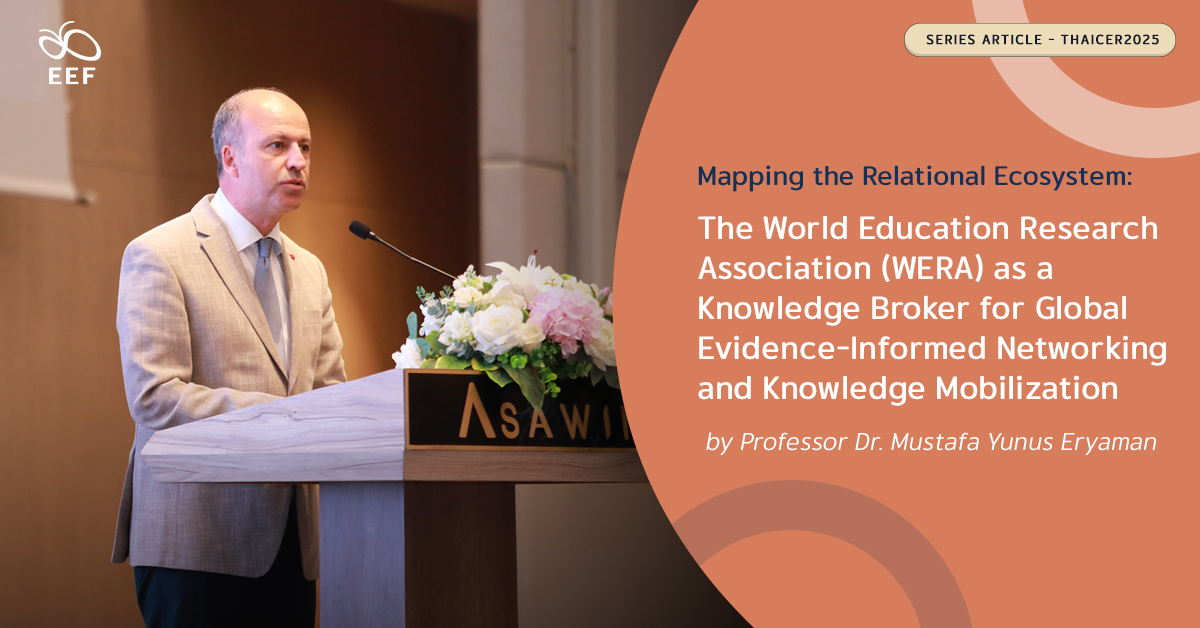
The 2025 Thailand International Conference on Education Research (ThaiCER), organized by the Office of the Education Council (OEC), took place at the Asawin Grand Convention Hotel in Bangkok from August 7th-8th. Hosting partners include UNICEF Thailand, the Equitable Education Fund (EEF) Thailand, the Princess Maha Chakri Award Foundation, SEAMEO STEM-ED, and various agencies of the Ministry of Education (MOE). This year’s theme, “The Education for the Future Begins Today,” captures the urgency and promise of transforming education amid global shifts.
Global challenges like the Fourth Industrial Revolution, climate change, demographic transitions, and expanding social inequalities confront education systems worldwide. In response, education must steadfastly pursue quality and equity through evidence-based policies, digital innovation, and holistic human capital development. These efforts aim to build a knowledge-based society in Thailand—one that is resilient, competitive, and sustainable—fully aligned with the philosophy of sufficiency economy. Central to these ambitions is collaboration: the OEC has partnered with 15 organizations to advance this vision under this theme.
Among key contributors is Dr. Mustafa Yunus Eryaman, Professor of Education at Çanakkale Onsekiz Mart University, whose expertise spans educational policy and philosophy, curriculum theory and research, critical pedagogy, and progressive education. He also serves as President of the International Association of Educators and Vice President of the World Education Research Association (WERA). At ThaiCER 2025, he delivered the address “Mapping the Relational Ecosystem: The World Education Research Association (WERA) as a Knowledge Broker for Global Evidence-Informed Networking and Knowledge Mobilization.”
This featured lecture series began with the introduction of two seminal works. The first, Evidence and Public Good in Educational Policy Research and Practice, co-edited with Barbara Schneider of Michigan State University, and the second, a multi-volume series published by WERA and Springer. The former dissects both the theoretical foundations and practical models for mobilizing research evidence effectively in educational policy and practice, presenting diverse perspectives on evidence-based education and the role of evidence in advancing the public good.
This notion of public good is central to WERA’s mission: to demonstrate how every branch of educational science can meaningfully serve society. One striking example, Dr. Mustafa noted, is Thailand’s EEF, which shows how scientific evidence can be harnessed to improve the lives of disadvantaged children. The book gathers insights from 24 contributors from the Organization for Economic Co-operation and Development (OECD) across the U.S., Denmark, Belgium, Sweden, Finland, Singapore, Australia, Spain, Turkey, and the Netherlands, analyzing case studies of public service delivery grounded in scientific research. A key question threads through these studies: how can we translate scientific evidence into effective educational policies and practices?
Answers emerge in part through the second work, which offers concrete examples of how scientific evidence can inform educational policy and practice within an international relational research ecosystem. Within this framework, Dr. Mustafa distinguished between two models: evidence-based policy and research, and evidence-informed policy and research—two approaches that differ not in the value of evidence, but in how it shapes decision-making.
- Evidence-Based Policy and Research
In 1996, David Hargreaves argued that educational research failed to provide policymakers with sufficient evidence to improve practice and policy at the national level. This perceived shortfall became a driving concern from 2000 onward, particularly for the UK’s Department for Education and Employment, the Office for Standardized Education, and the U.S.’s National Research Council and the No Child Left Behind Act of 2000. Their reports concluded that educational social science research did not answer the questions policymakers needed to develop effective educational policy, failed to offer practitioners clear guidance for improving professional practice, and suffered from methodological inconsistency, lack of continuity, and political motivation.
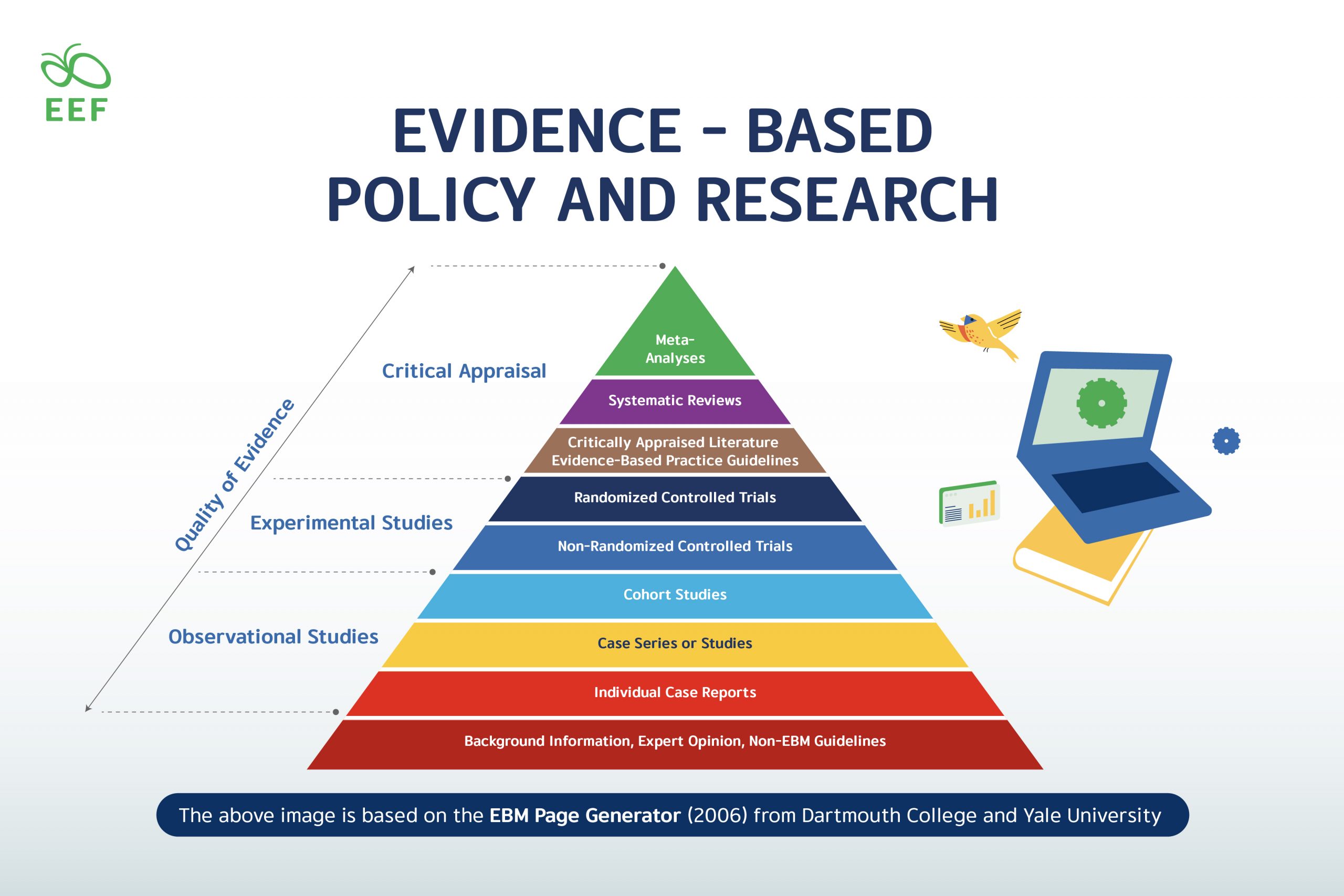
Such findings fueled calls for reform in education, research, and practice in both the UK and the U.S.. In the U.S., the movement became dominated by Randomized Controlled Trials (RCTs), with the Cochrane Collaboration representing the medical field and the Campbell Collaboration representing the social sciences. These initiatives positioned RCTs as the primary scientific methodology for developing rigorous research frameworks and actionable tools. From this approach emerged various “hierarchies of evidence.” At their apex stood meta-analyses and systematic reviews; at their base lay individual case reports, with qualitative research regarded as less scientifically robust.
This hierarchy, however, provoked strong backlash, particularly from liberal and left-leaning educational research communities in the UK and the U.S.. Critics argued that equating education with medicine was misguided, as the two fields operate within fundamentally different methodological and epistemological paradigms. They further challenged the top-down nature of evidence-based policy in education, warning that it risked privileging approved education achievements over the diverse realities of learners.
- Evidence-informed Policy and Research
From the debates surrounding evidence-based models emerged a second approach—one that adopts more flexible terminology. It may be described as evidence-informed, evidence-influenced, or evidence-aware policy and research, which are often used interchangeably. Despite similarity, the two approaches’ underlying principle differs in a fundamental way.
Rather than constructing rigid hierarchies of evidence, the latter calls for the development of evidence-guided practices that integrate the perspectives and contexts of diverse individuals and professional communities. Such an approach requires identifying the origins of evidence, selecting sources that are contextually relevant, navigating complexity, weighing the strength of supporting data, ensuring scientific credibility, and making the findings accessible through translation into multiple languages.
- WERA: Global Evidence-informed Networking and Knowledge Mobilization
WERA stands as the world’s largest educational research network, offering researchers, educators, and practitioners unparalleled opportunities to publish, disseminate, and collaborate on a global scale. At its core, WERA is driven by three interlinked goals: 1) Identify—spotting cutting-edge research and emerging trends across diverse contexts; 2) Connect—bringing together researchers, associations, institutions, and policymakers from multiple countries and disciplines to develop collaborative projects; and 3) Mobilize—ensuring that evidence is not generated in isolation, but actively disseminated, debated, and applied by practitioners in the field.
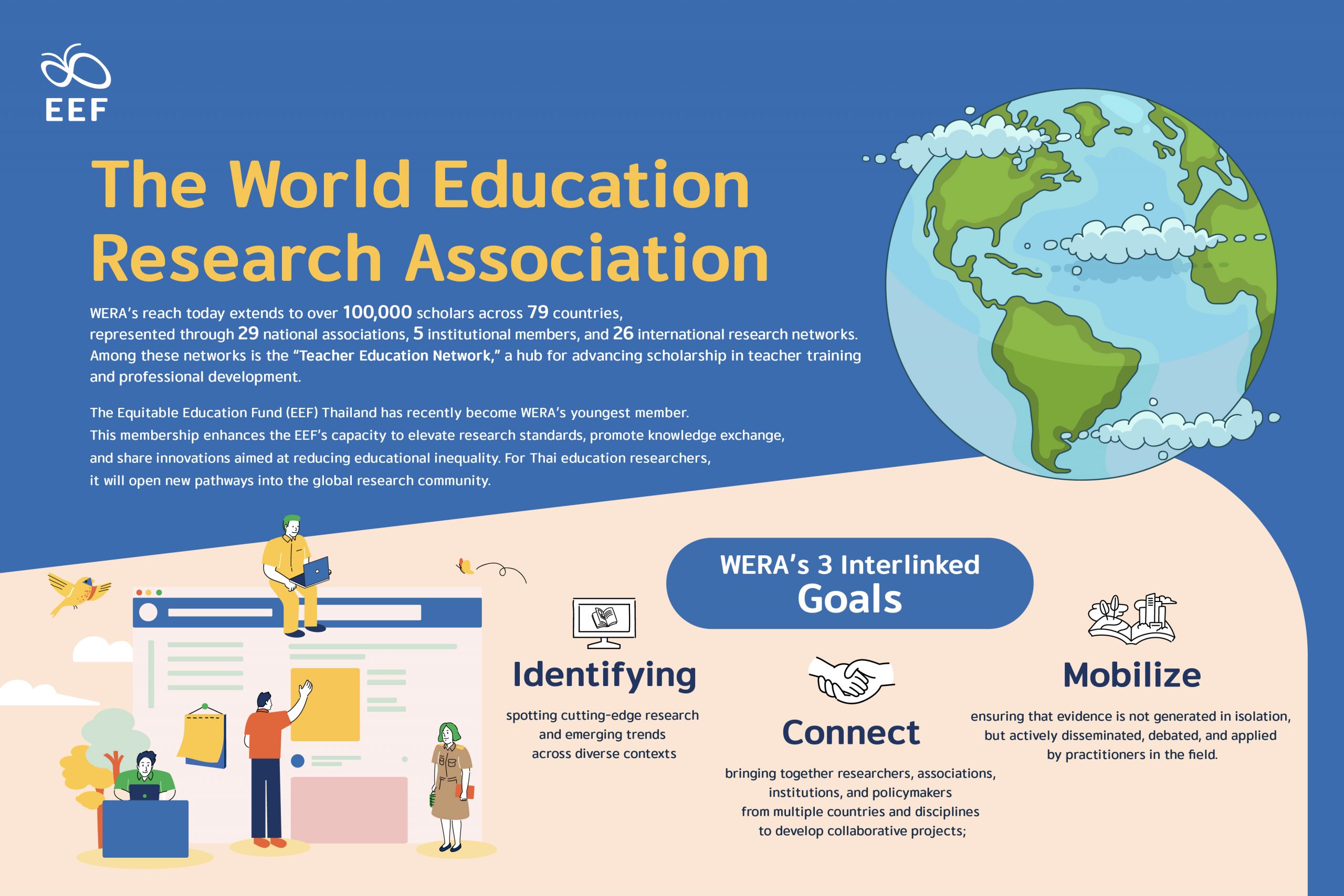
Today, WERA’s reach extends to over 100,000 scholars across 79 countries, represented through 29 national associations, five institutional members, and 26 international research networks. Among these networks is the “Teacher Education Network,” a hub for advancing scholarship in teacher training and professional development. Its membership spans prominent national member associations such as the American Educational Research Association (AERA), founded in 1916, which counts 30,000 members, 12 divisions, and 184 special interest groups, and has shaped educational research for over a century. In Asia, the Japanese Educational Research Association (JERA), established in 1941 with 2,800 members, has been a pivotal force, including in hosting international conferences.
Beyond national bodies, WERA also brings together regional member associations. The European Educational Research Association (EERA), founded in 1994, unites 40 national and regional research associations, making it one of Europe’s most influential policy-shaping and knowledge-driving organizations. Institutional member associations include the International Association for the Evaluation of Educational Achievement (IEA), established in 1958, which leads global benchmark studies such as PIRLS.
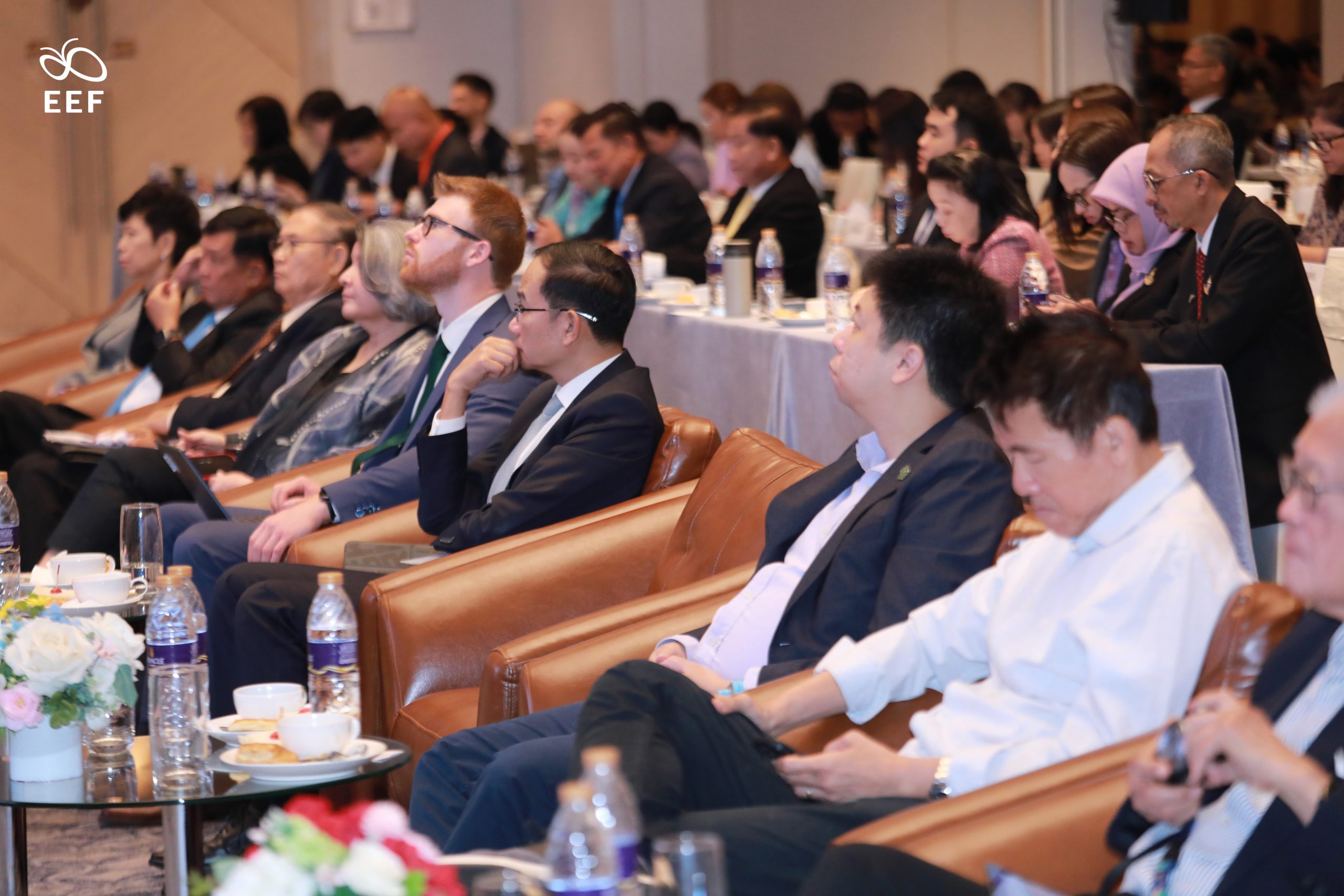
From Thailand, the EEF has recently become WERA’s youngest member—an important milestone in the Fund’s mission to foster academic and policy collaboration on an international stage. This membership enhances the EEF’s capacity to elevate research standards, promote knowledge exchange, and share innovations aimed at reducing educational inequality. For Thai education researchers, it will open new pathways into the global research community.
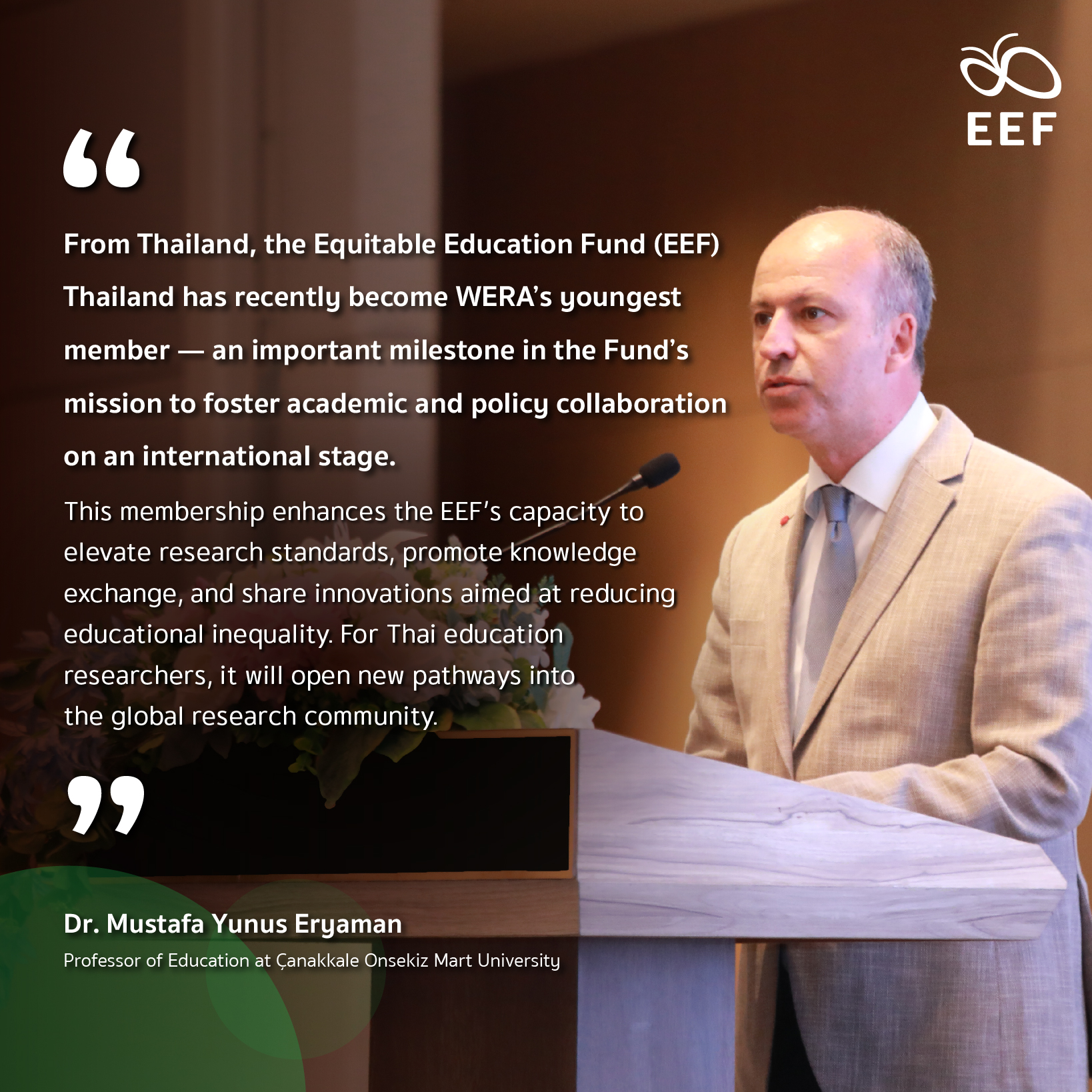
From Thailand, the Equitable Education Fund (EEF) Thailand has recently become WERA’s youngest member—an important milestone in the Fund’s mission to foster academic and policy collaboration on an international stage. This membership enhances the EEF’s capacity to elevate research standards, promote knowledge exchange, and share innovations aimed at reducing educational inequality. For Thai education researchers, it will open new pathways into the global research community.
Dr. Mustafa Yunus Eryaman, Professor of Education at Çanakkale Onsekiz Mart University
The opportunities for the EEF are substantial. Firstly, access to global networks now gives Thai researchers, policymakers, and practitioners direct channels to work alongside leading experts worldwide, gaining diverse perspectives, innovative methodologies, and comparative insights that can enrich the educational system. Secondly, enhanced research collaboration enables joint projects with international partners, such as leveraging Europe’s Erasmus+ program to strengthen higher educational capacity. Recent initiatives include exploring artificial intelligence in academic entrepreneurship at Thai universities, in partnership with institutions from Italy, Turkey, Germany, and Malta, fostering relational ecosystems between industry and academia. Lastly, a stronger voice on the international stage ensures that Thailand’s educational perspectives gain visibility and influence in global dialogues.
Amid ongoing efforts to establish the Thailand Educational Research Association (THERA), Dr. Mustafa expressed gratitude to the MOE for its support. A national association, he noted, could create new opportunities, including a central platform for interdisciplinary collaboration, linking researchers across fields, institutions, and regions to build Thailand’s own relational research ecosystem. Such an association could advocate for the strategic importance of educational research, shape national policy, secure greater resources for projects, and offer valuable professional development, especially for emerging scholars.
- Case Study: Evidence-Informed School Evaluation and Big Data Research
Dr. Mustafa illustrated how WERA fosters international collaboration through a groundbreaking example: an AI-driven school evaluation model developed jointly by national associations from Brazil, Germany, Turkey, Kosovo, and Poland. Together, they created software integrating artificial intelligence to assess school performance systematically.
The project’s objective is to develop a model of school evaluation that aggregates extensive data—especially from teachers—into the software, which then analyzes big data and feeds insights back to schools. This process reveals each school’s strengths and weaknesses across local, regional, national, and global levels.
The evaluation unfolds in three phases: Phase One involves international-level assessment. School principals input data based on multiple performance indicators. WERA supplements this with external factor assessments to ensure principals provide the highest-quality evidence, illustrating the school’s effectiveness on a second-tier level. Phase Two delivers performance feedback from the big data research center to schools, followed by stakeholder consultations—including teachers, parents, local organizations, and government representatives—to review and assess the report. Lastly, Phase Three focuses on schools developing their own models of excellence, subsequently applying these frameworks to improve their practices.
The evaluation uses seven performance indicators: leadership and administration; educational excellence; school cultures and values; counseling and guidance; 21st-century skills; community empowerment and public service; and safe and accessible schools. Evidence is assessed according to these criteria, guiding recommendations for both schools and ministries of education.
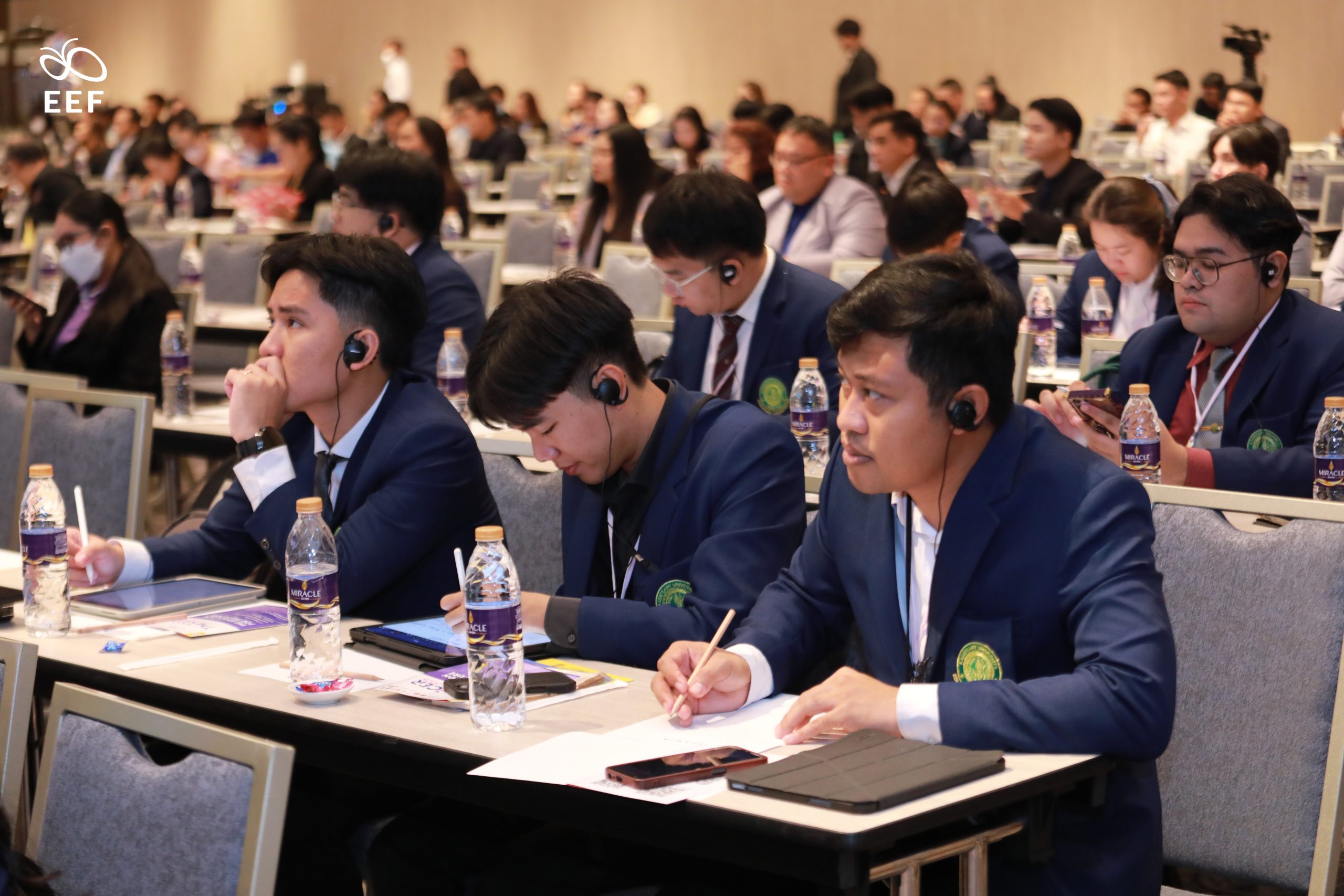
The pilot study includes 200 schools in Turkey testing the online software and evaluation model. WERA is collaborating with Turkey’s Ministry of Education to implement the project in four cities, aiming to complete the pilot in one country before expanding to others. Results are expected by 2028, with data eventually collected from 1 million teachers, 50 million students, and parents across 55,000 public schools.
The big data project, including evidence-informed school evolution, is scheduled for publication in 2026. AI agents developed in this project will assist teachers in enhancing teaching quality and student learning outcomes. Initially, these AI agents will tailor guidance to participating teachers, providing detailed, prompt feedback. Through self-reflection and goal-setting, the AI will help teachers recognize strengths and areas for improvement based on locally gathered evidence. Moreover, ongoing training will be organized aligned with policy needs to continuously support educators.

